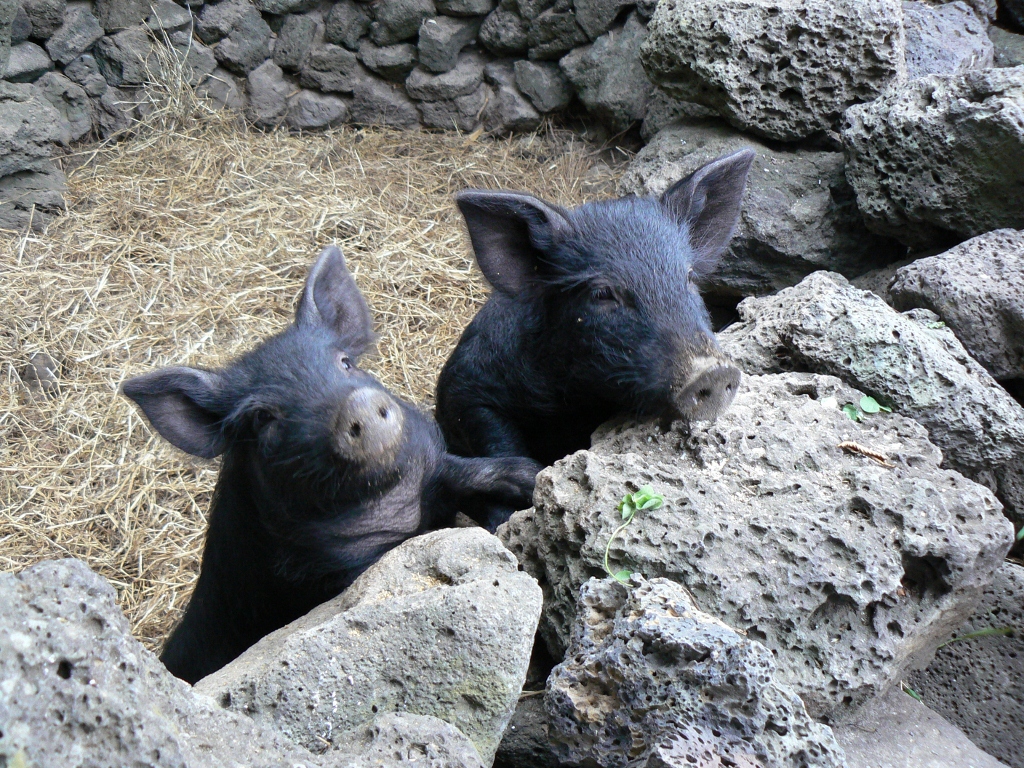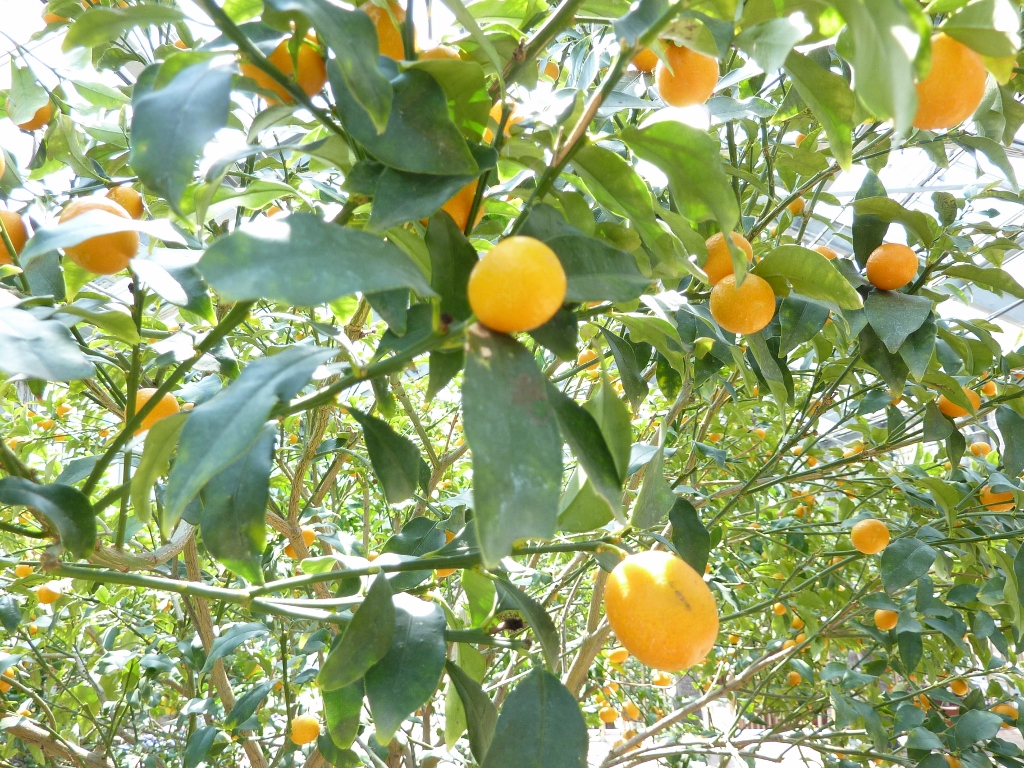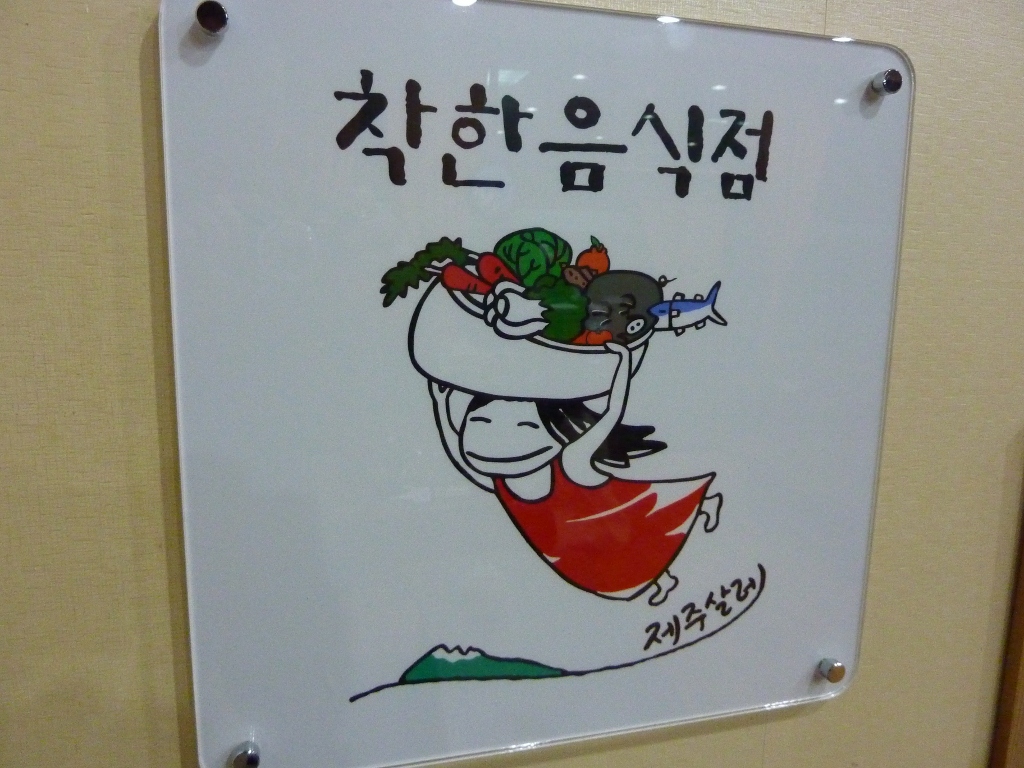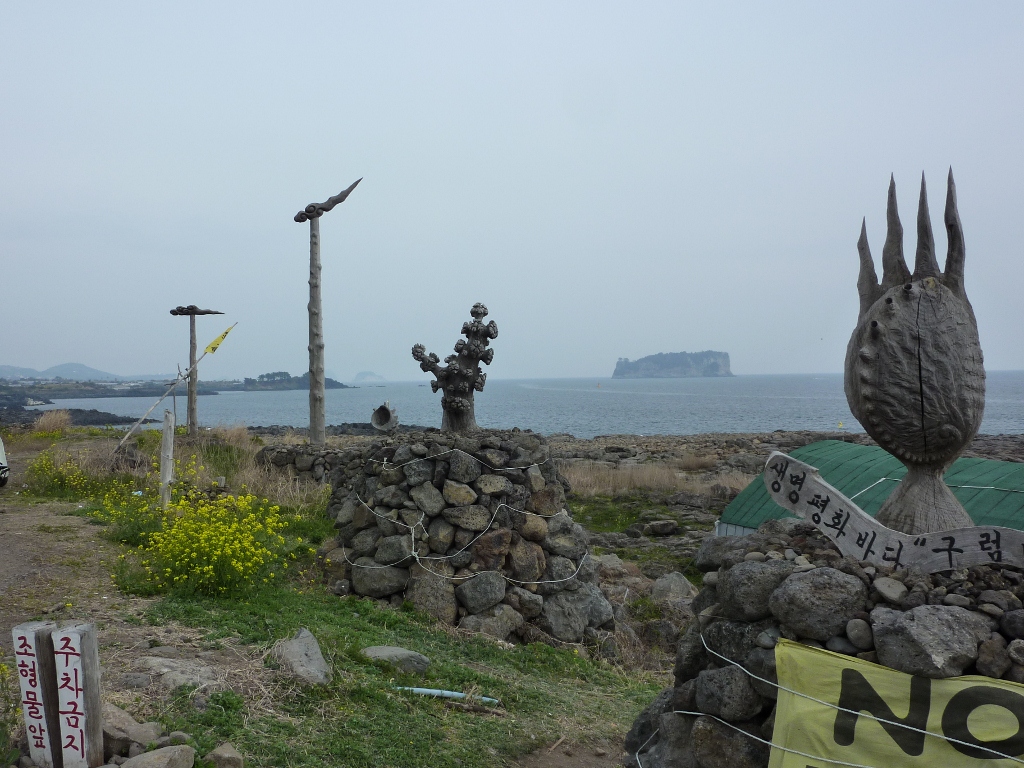Liberalizing the economy may crush the culture of one small island
Conducive Chronicle | August 31, 2011
Liberalizing the economy may crush the culture of one small island
The flight from Seoul to Jeju Island is only 45 minutes, but in Korea this is as far from mainland Korea you can get geographically and mentally. Jeju is a volcanic island located half way between the Korean mainland and the western tip of Japan. It is an island set apart from the rest of Korea in many ways. When you ask a Korean about Jeju, most will say: Jeju people are different. There are many reasons for this, but two main reasons are particularly evident: It’s a volcanic island where many of the crops grown on the mainland do not fare well in the poor soil and lack of surface water. Secondly, its isolated location has formed a people fiercely independent and proud. I have come to Jeju to discover its food because Jeju cuisine is as particular as the people and environment of this rocky island.
By Anders Riel Muller
August/September 2011 Conducive
Mount Halla (Hallasan in Korean) appears in the horizon as we begin the descent to Jeju. This 6400 feet tall extinct volcano at the center of the island rises majestically over everything else. Hallasan is a major hiking destination here and reaching the peak is something that most people in reasonably good shape can handle thanks to the well groomed trails, but I am not here to climb the volcano. I am here to discover how living underneath this massive lava mountain has shaped the local cuisine. Jeju food reflects the harsh conditions of the island. Rice is only grown in very small quantities because of the lack of surface water needed for rice cultivation. Instead, traditional Jeju cuisine is based on other grains such as millet and barley, vegetables, and meat including the famous Jeju black pig and pheasants. One thing in abundance here is seafood and fish. The nutrient rich waters and coral reefs surrounding this island make it a haven for seafood lovers. The fruits of the sea are often enjoyed raw such as the priced (and pricey) abalone and yellow tail. As such Jeju cuisine reflects both the abundance of the sea and the harshness of the volcanic rocks.
Having messed up my schedule I rush out the airport to meet with activist Sung Hee Choi who has arranged a meeting with the Chairman and Chairwoman of the Korean Peasants League (KPL) and Korean Women’s Peasant Association (KWPA) the same evening. We meet at the headquarters of the two organizations, most famous outside of Korea because of their fierce resistance to global trade liberalization. They explain to me how Jeju farmers are particularly under pressure due to trade liberalization and in particular from the upcoming free trade agreement with the U.S., something that Jeju farmers have highlighted several times during the negotiations, most notably when free trade negotiations (FTA) between the U.S. and Korea took place on Jeju in 2006.
Jeju farmers and local government issues felt that holding the talks on the island were an insult to farmers here who stand to lose their livelihoods because of the proposed free trade agreement. Jeju farmers are the main producers of citrus fruit for the Korean market and the importance of tangerines to the local economy cannot be underestimated. Agriculture accounts for 18% of the island’s economy and of those, 70% comes from tangerine cultivation according to the grassroots organizations, KPL and KWPA. Citrus have enabled Jeju rural communities intact compared to the rest of Korea where rural areas are depopulated at a mind blowing pace. Opening up the Korean market to cheap US citrus imports would simply wipe out most of the farm economy here. While citrus have been grown here for centuries, commercial production took off in the 1960’s when the Korean government heavily promoted domestic production of citrus fruit to reduce imports of food and thus improve the country’s trade balance.
Today Jeju tangerines are famous across the country and the pride of Jeju farmers. It has proven to be a generous fruit, well suited for the climate and provided economic security for thousands of families. On the southern part of the island tangerine groves are everywhere, but they a far cry from the huge plantation style citrus groves found in California and Florida. The majority of tangerine farms are family run, less than two hectares, and relying solely on a little bit of seasonal workers during harvest season. The tangerine groves are an integral part of Jeju’s cultural landscape and remind me of small citrus groves around the Mediterranean with their stone fences, nothing like its industrial American counterparts. The pressure from trade liberalization however may soon see the end to citrus production as the U.S. is pressuring the South Korean government to open up for its imports through the Korea US Free Trade Agreement.
On Jeju the response to the neoliberal trade agenda is to go local. Food sovereignty is at the heart of the peasant organizations’ current strategy at the national and local level, but it is an uphill battle. First of all, the government is more concerned about food security by expanding overseas production rather than supporting the country’s own farmers. Secondly, in order to promote exports of Korean electronics and cars in the U.S., the Korean government is willing to sacrifice its domestic agricultural production. Thirdly, farmers must transition much of its agricultural infrastructure from single cash crops to a more diversified agricultural model, but the farmers here are determined to make the transition and preserve their livelihoods and communities.
Korean farmers have long protested the market liberalization, which does not mean free competition, but more resembles a wipe out of South Korean agriculture and farmers at the hands of American subsidized food imports. In Jeju, and in many other parts of Korea, farmers have realized the futility of competing in a market where quantity and price are the deciding factors. By advocating for Food Sovereignty Jeju farmers are attempting to develop a new market for healthy sustainable local food that can counter the free trade logic and at the same time preserve the islands agricultural heritage.
During my visits to Jeju, I have heard many people tell me that Jeju food is not so interesting. That it is coarse and basic because of the harsh growing conditions on the island, but my experience of Jeju cuisine is the opposite. Local food on Jeju is fresh, and as delicious as the landscape is beautiful. Jeju specialties such as blackberry wine (Bokbunjae), Sushi (Hue in Korean), black pig, pheasants and of course tangerines are high on my list of favorite Korean food. Even those things that are grown and produced on the mainland as well seem to taste differently if it is grown and processed on this island. The Makgeolli, Korea’s traditional rice wine, benefits from the clean water coming from deep under snowcapped Mount Halla giving it a distinct taste.
It is this food heritage that the peasants of KPL and KWPA are seeking to preserve through their Food Sovereignty initiative. One of the most interesting projects is the native seeds cooperative founded by KWPA. Through the cooperative, women peasants protect and improve on native seeds used by farmers for centuries thereby not only protecting an important heritage, but also breaking free from corporate seed control. Cooperative members each grow and preserve seeds and exchange varieties amongst themselves. In this way, farmers preserve long held knowledge about the characteristics of individual seed varieties, preserve seed diversity, and thus the distinct knowledge and food culture of Jeju.
One evening I meet Professor Kim Jakyung of Jeju National University for dinner. Kim Jakyung is a young professor who returned to her native Jeju after earning her PhD in Japan in agricultural economics. Upon her return, she began to work with various local groups on ways to promote local food consumption on Jeju Island. We meet at a small restaurant in the middle of Jeju City, the largest city on the island. What makes this restaurant so special is that it is the first restaurant to be certified as a local food restaurant, Jakyung explains to me. Working on the certification system has been one of Jakyung’s biggest projects. For a restaurant to get certification, they need to document that at least 70% of the ingredients are sourced from local producers. The restaurant is Buddhist and we are served a delicious vegetarian meal consisting of a soup with homemade buckwheat noodles, greens in a sesame seed broth along with the obligatory side dishes called panchan. While eating, Jakyung tells me that she was inspired to go local as a response to the increased liberalization of agricultural trade. By promoting local and sustainable food she wishes to support local farmers. She is working to organize local distribution channels, build awareness campaigns and to help strengthen the sense of community on the island. Apart from the restaurant certification, the local food movement also started a local farmers market once a month in Jeju city. As the project progresses, she envisions to establish more processing facilities on the island to also ensure that what is produced locally is processed locally by locally owned businesses. At the current time, much of what Jeju produces is shipped to the mainland for further processing. Another area of focus is the provision of free school lunches at elementary schools on the island. Jeju was one of the first provinces to introduce free school lunches in Korea back in 2004. Jakyung wants to have more locally produced food served at school cafeterias, but a major problem, so far, is that the local government has handed over management of the school lunch program to agricultural cooperatives affiliated with their own party. However, she sees great potential in promoting local food through the school lunch program.
Having been encouraged by my meetings with peasant representatives and Kim Jakyung, I head down to the southern part of the island to visit the village of Gangjeong where things are less hopeful. Choi Sung Hee who volunteered as my translator during the previous days is an activist who has been living in Gangjeong for the past eight months to support the villagers in Gangjeong against the construction of a naval base that will destroy farming and fishing in the area.
As I approach Gangjeong, nothing seems extraordinary about this little sleepy village of 1500 people, but Sung Hee Choi tells me that Gangjeong means the “Village of Water” referring to the abundance of surface fresh water in the area, a rarity on this island of porous volcanic rock. The clean water from the Gangjeong stream is what makes the farmland some of the most fertile on the island. Greenhouse after greenhouse and citrus orchard after citrus orchard confirm that farming here is a good way of life for residents. Much of this will soon be paved over if the Navy and central government get their way. While the government claims that the planning process was transparent and according to democratic principles, villagers disagree. They claim they were bribed, intimidated and cheated and that the navy’s strategy has torn the village apart.
As we walk down to the beach, we pass bulldozed fields with cut down wilted citrus trees and collapsed green houses. The Navy contractors from Samsung and Daerim are not wasting any time despite the villagers’ protests and attempts to halt the construction through the court system. It is quite obvious that the physical destruction is part of the Navy’s strategy to eliminate resistance in the village. Some residents have already given up the fight and sold their land because they are afraid that they will be fined if they do not sell. In recent months the clashes between police and villagers have intensified with several hundred policemen descending on the tiny village on a regular basis. The struggle emphasizes that the threat to farmers and agriculture does not only come from international and transnational trade agreements, but also from the South Korean government itself. The Gangjeong struggle is only one of many land struggles going on right now between farmers and the government that is attempting to “modernize” Korea by paving over farm land with so-called “eco-parks”, science parks, and in this case a huge naval base that will destroy the livelihoods of local farmers and their communities. Thankfully, committed activists and villagers have been able to reach out globally and an international movement against the naval base is building up because it threatens the security of the entire region. With Shanghai only 300 miles away this naval base will serve a significant strategic role in the ballistic missile defense system that the U.S. is building up around China. While the Korean government highlights the economic benefits from the naval base, most locals know that the naval base inevitably will destroy their farms and their way of life, all because of political thousands of miles away in Washington DC.
Before I return to Jeju City, Sung Hee and I have time for some delicious fried black pig pork belly strips at one of the local restaurants. This is my third visit to Jeju Island and every time I leave I think of the delicious food one can find on this rocky island. For those who say that Jeju cuisine is course and uninteresting, I can only think that they have stayed in the big tourist resorts that the island has plenty of. If you venture to the small alleys and the countryside, you will be able not only to visualize the beauty of this island. You can also taste it.
Anders Riel Müller is a PhD student at Roskilde University in Denmark and a Research Fellow at Food First (www.foodfirst.org) and the Korea Policy Institute (www.kpolicy.org). He is also the tour coordinator for the South Korea Food Sovereignty in May 2012 (www.foodsovereigntytours.org).
*To learn more about the struggle of Gangjeong villagers against the naval base visit www.savejejuisland.org
** I would like to thank everyone at KPL and KWPA, Hae Sook Kim of Via Campesina, and Sung Hee Choi.









